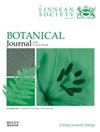普通黄茉莉花(Chrysojasminum fruticans, Oleaceae)基因流动的距离限制:对其交配策略研究的意义
IF 2.2
2区 生物学
Q2 PLANT SCIENCES
引用次数: 0
摘要
常见的黄茉莉花(黄茉莉花,油棕科)是一种二瓣花灌木,野生于欧洲西南部和地中海盆地。人们对其种群的遗传知之甚少,而这些信息对于调查其传播和交配策略是必要的。在这里,研究了法国南部13个种群之间的遗传多样性组织,包括一个有35年历史的试验田(“CEFE”,CNRS蒙彼利埃)。开发了标记(微卫星和索引)来筛选核、叶绿体和线粒体基因组的多态性。在其他茉莉科物种中,叶绿体和线粒体单倍型之间存在低连锁不平衡,这可能是由于父本在遗传上的泄漏。然而,对具有不同叶绿体和/或线粒体DNA单倍型的父母所产生的36个后代的分析仅揭示了母亲的贡献。天然居群在区域尺度上具有中高分化,核数据显示出较强的距离隔离模式,表明基因流动有限。一个位于边缘分布区域的孤立点(' Moulis ')与其他种群的遗传差异显著。进一步的研究应考虑具有不同遗传多样性的群体。人工“CEFE”种群也为在封闭系统中进行实验提供了机会。本文章由计算机程序翻译,如有差异,请以英文原文为准。
Limitation of gene flow by distance in the common yellow jasmine (Chrysojasminum fruticans, Oleaceae): implications for the study of its mating strategies
The common yellow jasmine (Chrysojasminum fruticans, Oleaceae) is a distylous shrub occurring in the wild in south-western Europe and the Mediterranean Basin. Little is known about the genetics of its populations and such information would be necessary to investigate its spread and mating strategies. Here, the organization of its genetic diversity was investigated among and between 13 populations from southern France, including a 35-year-old experimental plot (‘CEFE’, CNRS Montpellier). Markers (microsatellites and indels) were developed to screen polymorphisms in nuclear, chloroplast, and mitochondrial genomes. Low linkage disequilibrium was observed between chloroplast and mitochondrial haplotypes probably resulting from paternal leaks in their inheritance as reported in other species of tribe Jasmineae. Yet, analyses of 36 progenies issued from parents with distinct chloroplast and/or mitochondrial DNA haplotypes only revealed a maternal contribution. Natural populations of C. fruticans are moderately to highly differentiated at the regional scale with a strong isolation-by-distance pattern detected on nuclear data, indicating limited gene flow. An isolated site (‘Moulis’), located on the marginal distribution area, was remarkably genetically depauperate and highly differentiated from other populations. Further studies on the variation of mating strategies in C. fruticans should consider populations with contrasting patterns of genetic diversity. The artificial ‘CEFE’ population also offers opportunities for experiments in a closed system.
求助全文
通过发布文献求助,成功后即可免费获取论文全文。
去求助
来源期刊
CiteScore
5.70
自引率
8.30%
发文量
54
审稿时长
3.5 months
期刊介绍:
The Botanical Journal of the Linnean Society publishes original papers on systematic and evolutionary botany and comparative studies of both living and fossil plants. Review papers are also welcomed which integrate fields such as cytology, morphogenesis, palynology and phytochemistry into a taxonomic framework. The Journal will only publish new taxa in exceptional circumstances or as part of larger monographic or phylogenetic revisions.

 求助内容:
求助内容: 应助结果提醒方式:
应助结果提醒方式:


